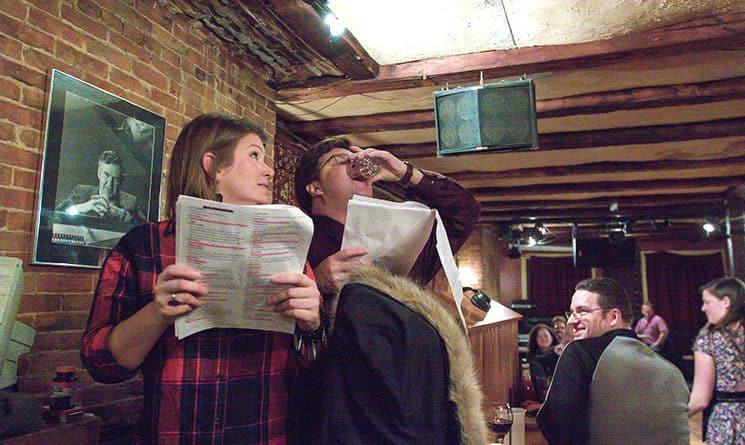Seacoast actors and playwrights hone their craft with play reading series
by Charlie Weinmann, photos by Jasmin Hunter
Actors don’t often momentarily pause a Shakespearean production for a shot of whiskey, but that’s exactly what happened at Seven Stages Shakespeare Company’s performance of “Troilus and Cressida” at The Press Room in Portsmouth in late January.
“A shot, please! Jameson. Neat!” said actor James Sears, after his character, Pandarus, delivered a lengthy rant. This wasn’t in the Bard’s original script, of course, but the audience, which was mixed in with the actors on the second floor of The Press Room, loved it. “Troilus and Cressida” was the latest in Seven Stages’ “ShakesBEERience” series — live readings of Shakespeare’s plays, in a bar, with the actors sitting, standing, shouting, and sobbing right next to audiences. There are no costumes, no sets, no lighting, just the actors and the play itself.
Seven Stages is just one of the Seacoast’s many play reading series, and for the actors, producers, and playwrights involved, the medium offers a chance to exercise creative muscles, hone their craft, and interact with audiences in a way that traditional productions don’t often allow.
“I think (“ShakesBEERience”) allows (the audience) to experience something brand new. … It’s not at a distance, they’re actually in it,” said Christine Penney, a co-founder and producing director for Seven Stages. “The audience is immersed in the entire thing from the get-go. I think that makes a big difference in the way you participate.”
Tim Jacobs gets the audience involved during a ShakesBEERience event at The Press Room.
Breaking the wall between audiences and performers allows for surprising, fun moments — like a character ordering a drink in the middle of a play. But live readings also allow theater companies to present plays by local or lesser-known playwrights — shows that otherwise might not make it to the stage as a full production.
“Performers like performing,” said Kent Stephens, founder and artistic director of Stage Force, which holds monthly play readings at The Music Hall Loft in Portsmouth. “We do scripts that, if we didn’t do them, wouldn’t be seen or heard here.”
That’s a sentiment echoed by Susan Turner, a member of Generic Theater, a company that stages live readings at The Players’ Ring in Portsmouth.
“It’s like getting a story read to you, or like a book on tape. You’re hearing it without the costuming. … You’re getting the essence of the play,” Turner said.
According to Turner, Generic Theater chooses a mix of new works by local playwrights and lesser-known plays for its series. It’s a way to expose audiences to new works while giving playwrights a space to refine their scripts and gauge audience reaction. The series also gives scripts that otherwise wouldn’t make it to the stage (if, for example, they were difficult to turn into a full production) a performance venue.
“It’s like getting a story read to you, or like a book on tape. You’re hearing it without the costuming. … You’re getting the essence of the play.”
— Susan Turner of Generic Theater
“It gives new playwrights time and space,” Turner said. “They might be able to play with it more and rework it with the comments. Then it might work (for a full-sized production.)”
Generic Theater performs 10 readings a year, and roughly half of them are by local playwrights, Turner said. The company has been performing in the Seacoast for more than three decades, and in that time, it’s gained a loyal audience and a dedicated troupe of actors, according to Turner.
“For Generic Theater, it’s all about the demographics,” Turner said. “We’ve been around for 33 years and we have older people now who are actors and actresses. We look for scripts that have a number of roles for older people.”
Other than being able to have a beer while performing, why do actors enjoy presenting plays in this fashion?
“It’s like going to the gym,” says Penney. “It’s like an actor’s gym. It keeps you fresh, and working your skills, and listening. Listen, listen, listen, and respond truly. … It’s scary and terrifying in the best of ways. We’ve had a lot of actors say to us afterwards, ‘I was terrified to do this, and thank you for asking me to do it. I needed the push, I needed the challenge.’”
Jessica Miller performs at ShakesBEERience.
Dan Beaulieu, a co-founder and artistic director for Seven Stages, agreed.
“We get the same thing that we give, which is permission … permission to have fun and to have that freedom. A thing might happen that might be deemed … failure elsewhere, but in this environment that mistake can end up being one of the most funny moments, one of the most engaging moments of the night.”
Toward the end of Seven Stages’ reading of “Troilus and Cressida,” when many of the characters start dying, one of those moments took place. As Hector, played by Chris Savage, struck down a “Greek in sumptuous armor” played by Bruce Pingree, Pandarus reappeared and sang a sorrowful tune. He dropped to the floor and lay on Pingree and coughed loudly on him. Pingree started to chuckle.
“Stop laughing! You’re dead!” Sears yelled. The audience kept laughing, though, and it was clear that, even if Pingree’s Greek was dead, the play itself was most certainly alive.
Kent Stephens’ Stage Force play reading series presents Tim O’Brien’s “The Things They Carried” on Monday, Feb. 16 at 7:30 p.m. at The Music Hall Loft in Portsmouth. Generic Theater returns to The Players’ Ring on Wednesday, Feb. 18 at 7:30 p.m. Seven Stages Shakespeare Company presents “Hamlet” at The Press Room in Portsmouth on Monday, Feb. 23 at 6:30 p.m.
At top of page: James Sears takes a shot as Christine Penney looks on during their reading of Shakespeare’s “Troilus and Cressida” at The Press Room on Jan. 26.

